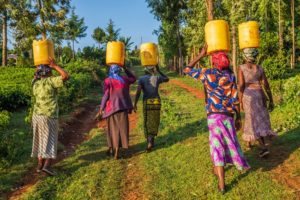What are the top countries for gender equality?
The world is still far from achieving gender equality, with some countries doing a lot better than others. Here we take a look at which nations have the highest gender…
Read More
Written by Olivia Nater | Published: January 10, 2023
Feminists are well aware of the urgent need to advance women’s rights, which is essential in its own right, but the world is still largely silent on the tremendous, unmatched societal and environmental benefits of achieving global gender equality. It’s high-time policymakers and funders give it the attention it deserves.
While great progress has been made towards achieving gender parity in education and literacy, women remain severely underrepresented in leadership and decision-making positions. Only 14 countries have at least 50% women in their national cabinets, and only a quarter of all parliamentarians are female. Just 24 countries have a female head of state or head of government. Globally, women still get paid around 37% less than men for the same jobs.
By far the worst inequalities relate to bodily autonomy and safety from harm. According to the UN, one-in-five girls is married before turning 18, one-in-three women is subjected to gender-based violence, and almost half of women in developing countries have no decision-making power regarding their own bodies. Sexual harassment is still rampant and women in cities across the world are unable to feel safe when walking alone at night.
 There are 257 million women with an unmet need for modern family planning, 218 million of them living in low- to middle-income countries. Nearly half of all pregnancies are unintended, and pregnancy complications, including unsafe abortions, claim more than 800 women’s and girls’ lives every single day. Teenage girls are particularly hard-hit by these injustices—pregnancy and childbirth complications are the leading cause of death for 15-19-year-olds. Girls are also disproportionately affected by HIV and AIDS—in eastern and southern Africa in 2017, 79% of new HIV infections in 10-19-year-olds were among girls.
There are 257 million women with an unmet need for modern family planning, 218 million of them living in low- to middle-income countries. Nearly half of all pregnancies are unintended, and pregnancy complications, including unsafe abortions, claim more than 800 women’s and girls’ lives every single day. Teenage girls are particularly hard-hit by these injustices—pregnancy and childbirth complications are the leading cause of death for 15-19-year-olds. Girls are also disproportionately affected by HIV and AIDS—in eastern and southern Africa in 2017, 79% of new HIV infections in 10-19-year-olds were among girls.
These facts should outrage everyone, but many people—especially the most privileged among us—remain largely ignorant about the severity of gender inequality, and our patriarchal societies have been conditioned over many generations to accept a status quo that favors men.
We must do all we can to fuel the feminist movement, and that includes demonstrating how empowering women and girls benefits everyone, everywhere. It also benefits the planet. Population Connection is one of few environmental organizations that actively advocate for feminist policy change, which is critical for tackling our biggest planetary crises.
A landmark 2019 report by the Intergovernmental Science-Policy Platform on Biodiversity and Ecosystem Services (IPBES) demonstrated that the sixth mass extinction—probably the most neglected environmental crisis—is still accelerating, with one million plant and animal species now at risk of disappearing for good. The reason is our failure to confront the root causes: overconsumption and human population growth, which fuel habitat destruction and overexploitation of species. In places where individual ecological footprints are small, population growth is often the biggest driver of biodiversity loss. A 2019 study published in Nature Scientific Reports, for example, found that human population density was the most important predictor of nature loss in Africa, with the most densely populated areas suffering the worst damage.
Natural resource depletion is also directly linked with population growth. Earth Overshoot Day 2022 fell on July 28, the earliest it’s ever been. It marks the day on which humanity has used up all the resources the planet can regenerate in a year. Unsustainable lifestyles in high-income countries are a major reason for ecological overshoot, but the other root cause is a growing consumer base. According to the Global Footprint Network, if we achieve a population of 7.7 billion by 2050 instead of the 9.7 billion we’re headed towards, we could move Earth Overshoot Day back by 49 days, which makes it the second most powerful of their proposed solutions, after decarbonizing our economies.
 Population growth (especially in high-consuming countries) obviously also leads to more greenhouse gas emissions. According to an analysis of all available climate solutions by Project Drawdown, averting the UN’s high population growth scenario by removing barriers to family planning and girls’ education would save around 70 Gigatons of CO2 by 2050, which represents their third most powerful action to limit warming to 2°C.
Population growth (especially in high-consuming countries) obviously also leads to more greenhouse gas emissions. According to an analysis of all available climate solutions by Project Drawdown, averting the UN’s high population growth scenario by removing barriers to family planning and girls’ education would save around 70 Gigatons of CO2 by 2050, which represents their third most powerful action to limit warming to 2°C.
Fortunately, empowering women to take charge of their bodies and lives happens to be the most effective way to slow and end population growth. Wherever women have the power to choose their family size and to pursue educations and careers, fertility rates plummet—so much so that growth-addicted governments around the world are now trying to pressure women into having more babies.
The environmental and social benefits of women’s empowerment extend well beyond its effect on population growth. Entire communities become more prosperous and resilient when women are able to make their own fertility decisions, raise healthier children with better life prospects, and increase their household income.
Research shows that, on average, women have a higher capacity for empathy than men, which is evident in the fact that higher female representation in decision-making leads to more policies aimed at protecting the environment and improving health. Further proof lies in the heavy female skew in the non-profit sector and among community volunteers, charity donors (despite the gender pay gap), as well as vegans and vegetarians. Empowering women is critical for peace and stability as well: including women in peace talks makes negotiations longer-lasting and less likely to fail.
 Investing in women and girls would advance all 17 of the UN’s Sustainable Development Goals (SDGs)—this is sorely needed in light of the most recent progress report showing we are on track to miss almost all of them, with several indicators worsening instead of improving.
Investing in women and girls would advance all 17 of the UN’s Sustainable Development Goals (SDGs)—this is sorely needed in light of the most recent progress report showing we are on track to miss almost all of them, with several indicators worsening instead of improving.
Governments, NGOs, and funders around the globe need to open their eyes to the unmatched benefits of empowering women and girls and take action to create a feminist future. The tireless women’s rights movement has achieved many incredibly hard-won victories over the decades, but we still have a long way to go and continue to suffer major setbacks. The world is not yet a safe and supportive place for women and girls—let’s change that and save the planet at the same time.